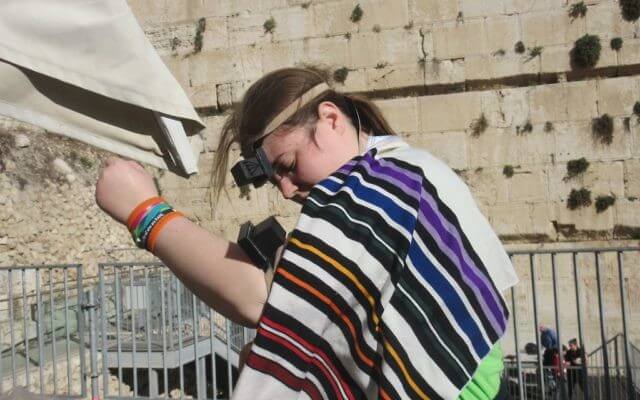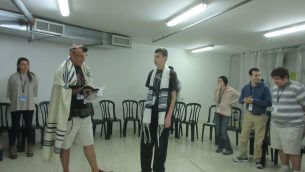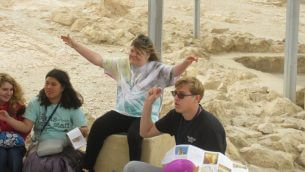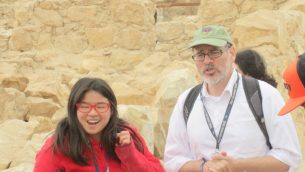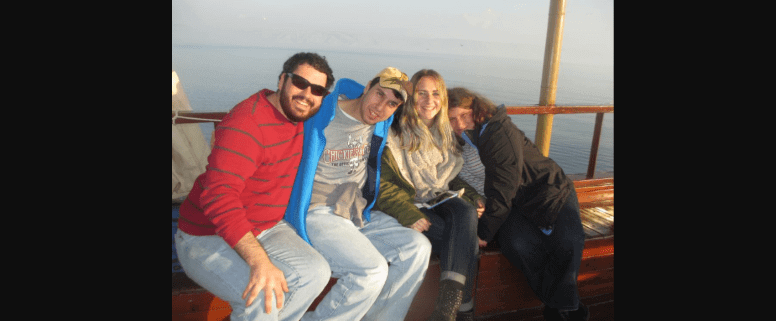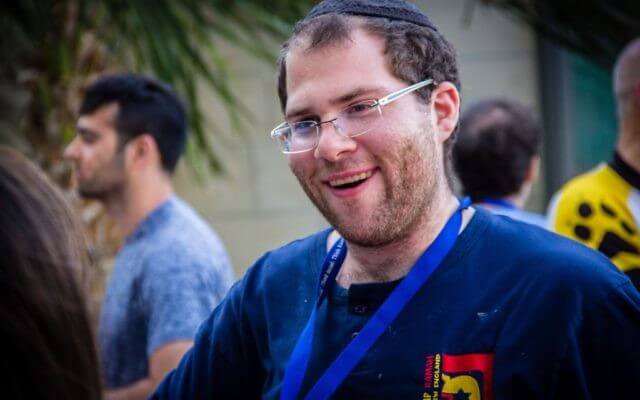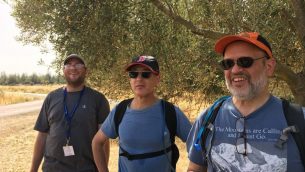Original Article in the Jerusalem Post
As the bus rolls up to the army base, A., one of the participants on the first ever Amazing Israel: Ramah Tikvah trip, begins to cry.
“No, there are soldiers here and they’ll have guns,” she moans. “No, no, no, no.”
Staff member Liz Offen speaks quietly and calmly.
“I know this is difficult for you,” she tells A. “We’re here for you. I know you can do this.”
A., holding hands with a friend, cautiously gets off the bus. At first she won’t even enter the large warehouse where special needs Israeli soldiers are folding army uniforms. She sits down outside, her friend with her, but she has stopped crying.
The participants on this Birthright trip, most of whom have attended the Tikvah program at different Ramah camps in the US, have a wide range of disabilities, both physical and emotional. They have come to the Bilu army base in Rehovot, outside Tel Aviv, to meet Israeli soldiers who also have disabilities and who are part of the Special in Uniform project.
The project takes more than 300 young Israelis with significant disabilities and trains them to do simple jobs in the army. It starts when the participants are still in school, which they attend until age 21. They can then volunteer for the army, and, if found suitable, can be inducted.
The Bilu army base is a logistical base for the Paratroopers Brigade. Today, the students are folding army uniforms and tying them together in stacks of five. They come one day a week as part of their school program.
“The goal is to integrate them into Israeli society,” said Tiran Attia, a retired lieutenant-colonel, who runs the program. “It is good for them, but it is also good for the regular soldiers. It teaches them to become more compassionate.
The army runs a separate program called Ro’im Rahok (Seeing Far), which integrates young high-functioning adults with autism in Israeli intelligence units.
The young uniform folders carry tables outside so that the Birthright participants can help with the folding. A few participate, but most just watch.
The Birthright participants enjoy putting on Israeli army uniform shirts and hats. One young man proudly says that his father served in the army and he is happy to be visiting an army base.
This is the first time that Birthright Israel has partnered with Tikvah of Camp Ramah. Tikvah is a program for campers with special needs at each of the Ramah camps. The Camp Ramah spirit infuses this trip, which includes daily tefillot, or morning prayers, as well as a spirited version of “Rise and Shine” complete with hand gestures.
Howard Blas, the director of the National Ramah Tikvah Network, and one of the organizers of the special needs trip, says they made some changes to the traditional Birthright itinerary, while still hitting up the major sites in Tel Aviv, Jerusalem, the Golan Heights, Masada and the Dead Sea.
For example, the group did visit the Yad Vashem Holocaust Museum in Jerusalem, but kept to a few of the smaller exhibits, rather than the main museum, which can take several hours to go through and is difficult to exit once you begin.
“We did a lot of things that are very multi-sensory like chocolate making, a jeep ride in the Golan and tree planting,” he said. “We also tried to do as many things as possible with animals because they love animals.”
Birthright has so far brought 600,000 Jews on free 10-day trips to Israel, including 2,000 adults with special needs.
Birthright CEO Gidi Marks says it is committed to bringing every young Jew who wants to visit Israel on a trip.
“OFFERING SPECIAL needs trips fits in with our broad mission of enabling each and every young Jew around the world, regardless of their circumstances, to take part in a once in a lifetime trip to Israel and connect with their Jewish heritage and identity,” he said. “These trips include all the hallmarks of the usual Birthright Israel experience: heritage sites, Israeli peers and countless special moments allowing them to connect with Israel and the Jewish heritage. Additional staffing and educational content customizations are made when and where necessary.”
For the parents of these young adults, it was a chance for their kids to be just like their neuro-typical siblings.
“I don’t think he would get an opportunity like this any other way,” Aron Wolf, whose son Danny has cerebral palsy and limited verbal ability, said. “I was skeptical that it would come through but it did. As far as I know, this is the first time that somebody with Danny’s disabilities has been included in any Birthright trip.”
Birthright Israel funded a caretaker for Danny, as well. His parents, like the parents of all the young adults on the trip, were thrilled to see the photos posted on Facebook each day. They also checked in with the caretaker frequently by phone.
“It sounds corny but he has the same birthright as any other young adult who is Jewish to experience Israel independently without his parents,” Danny’s mother, Michelle Wolf, said.
This is the first time that Danny has been so far from home. While he attends Camp Ramah in California, Michelle says that she is just a short flight away. She says she was concerned about sending Danny so far away alone.
“The idea of him being so far away from me was difficult,” she said. “I would have never even considered it if he hadn’t spent all of those summers at Camp Ramah.”
Tour guide Doron Kornbluth specially requested to guide this Birthright group. While most Israeli tour guides compete to stuff in as many sites and as much content as possible, Kornbluth said he had to take the participants’ disabilities into account.
“YOUR EXPECTATIONS have to be completely different,” he said. “A tour guide who is really invested wants to start early, end late, pack in a lot of information, teach a lot of history and that’s just not doable for this group. You cannot do as much at all.”
Another challenge is the range of disabilities of the participants. While all of them, except Danny, are able to walk, and most are able to speak clearly, a few are higher functioning.
Rachel Tracosas, 22, from Madison, Wisconsin, has high-functioning autism.
“It’s been an amazing experience to connect with my roots here in Israel,” she said. “I loved going donkey riding and going to the Kotel, which is what my brother did when he did Birthright last summer.”
The participants seemed to connect deeply with each other. Tracosas fed Danny at a lunch stop when the participants were given a budget and could choose what they wanted from a kosher food court in a local mall. Even that small independent step was exciting for them. They looked at all possible choices and discussed them before making their final decision.
Michelle Wolf said Danny’s caretaker told her that he is popular and that the participants all wanted to push his stroller. During lunch, several of the girls gathered around him, feeding him and smoothing his hair.
And every morning, when Danny managed to pull himself onto the bus by himself, his new friends gave him a spontaneous round of applause

